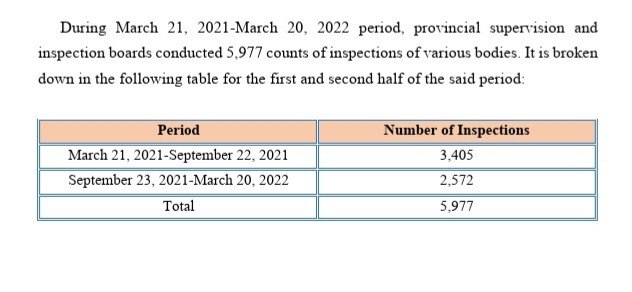The full text of the bulletin follows:
a. Law on Respecting the Legitimate Freedoms and Protection of Citizens' Rights
Pursuant to the Law on Respecting the Legitimate Freedoms and Protection of Citizens' Rights, adopted in 2004, a central board and provincial boards monitoring civil rights respect were established within the Judiciary. In addition to conducting inspection from the judiciary’s law enforcement authorities, tribunals, prosecutor’s offices and prisons, these boards examine reports and complaints by people for necessary action. Provincial supervision and inspection boards submit every six months a report of activities thereof to the central board of civil rights safeguard. The central board examines provincial reports and assesses implementation of law, decides about dispatching additional inspection groups to the four aforesaid organs and forwards complaints to relevant bodies and follows up on their process to the end.
Generally, by virtue of the Law on Respecting the Legitimate Freedoms and Protection of Citizens' Rights, all courts, prosecutor’s offices and law officers are required to take into consideration the points listed hereunder in the exercise of jobs thereof. Any violation shall be subject to punishment provided in law.
1.Exposure of crime and prosecution, investigation, custody and other injunctions should be in compliance with law and specific and transparent judicial orders, thereby avoiding any application of personal view and abuse of power or meting out any violent conduct or additional and unnecessary detentions.
2. Inculpation should be based upon legal arrangements and concern specifically the perpetrator, the accomplice and the accessory-at-fact. As long as the offense has not been proven in competent court and a reasoned ruling, based upon statutory articles or reliable Islamic law, has not been finalized, the presumption of innocence applies and every person is entitled to security provided in the law.
3. Courts and prosecutor’s offices are required to respect the defendants and plaintiffs’ right to defense, thereby providing them access to attorney and expert.
In dealing with complainants, suspects, perpetrators of crimes and indifferent witnesses, and generally in the exercise of duties assigned and in dealing with people, Islamic moralities and principles should be fully respected.
4.The principle of prohibition of arrest and detention requires any detention to be compliant with arrangements provided in the law. The case is referred to competent judicial body within deadline set thereto and the family of detainees are informed of.
5.Throughout arrest and interrogation or collection of information and investigation, any act of persecution like blindfolding or tying other parts of the body, humiliation and degradation should be avoided.
6.Questioners and investigators should refrain from covering the faces of defendants or sitting behind them or taking them into unknown locations and any other unlawful conduct.
7. Local inspections and probes for arresting fugitive suspects or discovering tools of crime should be carried out based upon legal regulations, without causing any nuisance and with full prudence. The documents or objects without connection to the crime or not belonging to the defendant should remain inviolable while the letters, manuscripts and family photos and films should not be disclosed or seized unreasonably.
8. Any torturing of defendants to extract confessions or forcing them into any other activity is forbidden and confessions extracted in this way would be devoid of any statutory and legitimate ground.
9.Probes and interrogations should be conducted based upon scientific and legal principles and methods and trainings and under necessary supervision. Anyone dishonoring arrangements and regulations or resorting to wrongful methods in the exercise of duty should be dealt with in compliance with law.
10.Questions should be helpful, transparent and relevant to the charge or charges and any curiosity to gain personal and family information or asking about the previous wrongful acts and any issues with no effect in the case should be avoided.
11.Responses should be written down without any modification and be read out to the respondent. Literate persons can write the answers themselves in a bid to avoid any suspicion of distortion or insinuation.
12.Courts and prosecutor’s offices exercise serious supervision over detention centers run by law officers or the organs required by law to carry out special duties thereof as well as the officers’ treatment of defendants. Those who enforce law correctly should be rewarded while wrongdoers should face legal action.
13.Tampering with the property and objects seized from the defendants unduly is forbidden and the seized items should be decided upon as soon as possible by court or prosecutor’s office. As long as no judicial decision has been made thereto, they should be safeguarded and no personal or administrative use thereof is authorized.
14.The Chief of the Judiciary is tasked with naming a board to supervise the proper enforcement of points enumerated hereinabove. All organs related in a way to these points are required to show necessary cooperation with the said board, which is obligated to deal seriously with any violation of law while trying to correct methods and make them compliant with regulations and finally reporting to the Chief of the Judiciary.
15. Measures for Enforcement of the Law on Respecting the Legitimate Freedoms and Protection of Citizens' Rights, March 21, 2021-March 20, 2022
1. Inspections
During March 21, 2021-March 20, 2022 period, provincial supervision and inspection boards conducted 5,977 counts of inspections of various bodies. It is broken down in the following table for the first and second half of the said period:

2. Complaints Filed with Inspection Boards
During the March 21, 2021-March 20, 2022 period, 3,181 complaints were filed with the supervision and inspection boards and then investigated.
3. Results of Inspections and Examination of Complaints
In case throughout inspections or complaints, any violation of civil rights is ascertained, the facts, as the case may be, shall be reported to the administrative infractions boards, Disciplinary Court of Judges or judicial organs. In some cases, the judicial or administrative staff receive notices. Furthermore, the staff who make special efforts to enforce the Law on Respecting the Legitimate Freedoms and Protection of Citizens' Rights shall be rewarded.